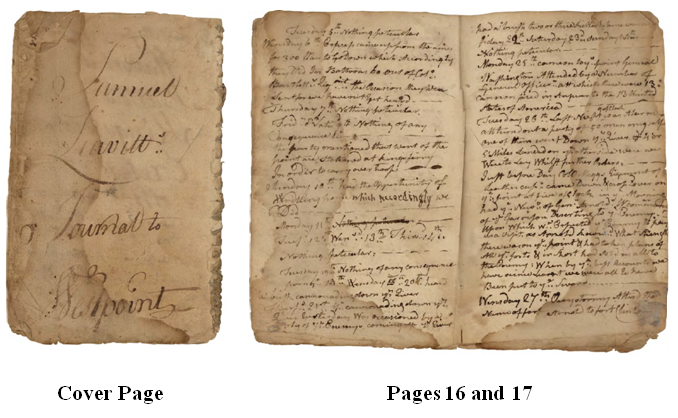Archive for May, 2010
Written on: May 24, 2010 | 1 Comment
At the National Archives and Records Administration, we care for our nation’s most beloved documents. The Declaration of Independence, the Constitution of the United States, and the Bill of Rights are our most well known national treasures, but in the stacks there are many others, some of them not yet discovered. At a researcher meeting last month, I met Jonathan Webb Deiss, a researcher at the National Archives. His knowledge, passion, and enthusiasm for discovering treasures makes him a model citizen archivist. Jonathan told me how he found a previously undiscovered Revolutionary War diary in Record Group 46, Records of the U.S. Senate. As a knowledgeable and skilled researcher, Jonathan knew that Samuel Leavitt’s Journal to Westpoint was important. One can easily imagine his excitement and anticipation in that moment of discovery.

Jonathan told me that Samuel Leavitt was a soldier from Stratham, New Hampshire. He enlisted in early July 1780 to serve a three month tour. The journal starts on July 5, 1780 and covers his march to West Point, his tour of duty, and march back to New Hampshire in October 1780. On page 17 of the diary, Samuel Leavitt describes General Washington at West Point and hearing the “news of Gen’l Arnold the commander of the Garrison deserting to the Enemy.” Watch the following video of Jonathan describing his discovery,… [ Read all ]
Written on: May 14, 2010 | 2 Comments
In our new exhibit, “Discovering the Civil War,” you can examine the hospital muster roll card of Christianna Batts, who was one of at least 2,000 African American women who worked in U.S. hospitals. Identified on the record as an “adult female contraband,” she was most likely a runaway slave seeking safety behind Union lines. You can also compare the pictures of Sarah Emma Edmonds Seelye dressed as herself and her alias, Frank Thompson. She proved her military service and was granted a $12 monthly pension for the life-long disability she suffered as a result of the war. The Congressional bill granting her pension is also on display.
I hope your experience in this space will lead to new insights or provoke a deeper understanding of the complexity of the war. It’s the personal nature of our own discovery that is so interesting to me. The Civil War ended almost 150 years ago, but individually and collectively, we are still grappling to understand the immensity of what took place.
Walt Whitman said, “The War of Attempted Secession has, of course, been the distinguishing event of my time.” Certainly for Christianna Batts, Sarah Seelye, and all who were swept up in it, the Civil War was transformative. The records preserved in the National Archives provide documentary evidence of the remarkable stories of ordinary people as well… [ Read all ]
Written on: May 6, 2010 | 9 Comments
If you’re reading this, the following statistic from a recent Pew Internet report applies to you:
Fully 82% of internet users (representing 61% of all American adults) looked for information or completed a transaction on a government website in the previous twelve months.
It probably doesn’t surprise you that increasingly Americans are relying on the internet for access to government information. More and more this is taking the form of social media tools like blogs, social networking sites, and services like Twitter or text messaging. While the social nature of this type of engagement makes the tone more informal, it does not indicate that the engagement is trivial.
In the same Pew Internet report, three-quarters (79%) agree with the statement that having the ability to follow and communicate online with government using social media tools “helps people be more informed about what the government is doing,” while 74% agree that it “makes government agencies and officials more accessible.”
In today’s digital age, the National Archives and Records Administration must fulfill its mission not only in the research rooms, regional archives, and presidential libraries, but also in cyberspace. Through our website and creative use of social media tools, we can provide access to the records that document the actions of our government. This enables greater transparency, a crucial pillar of open government.
What does it mean… [ Read all ]

